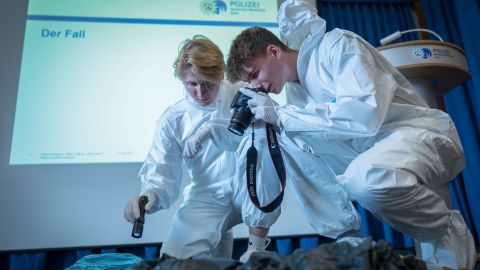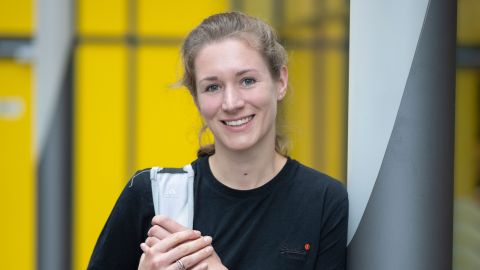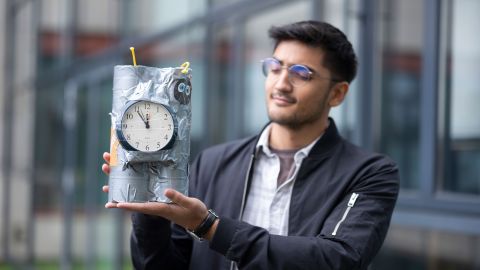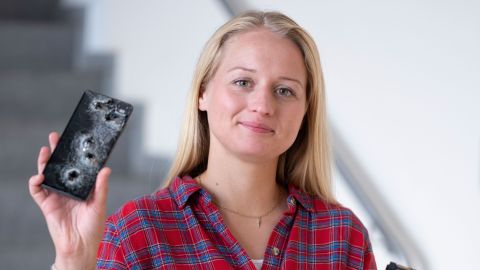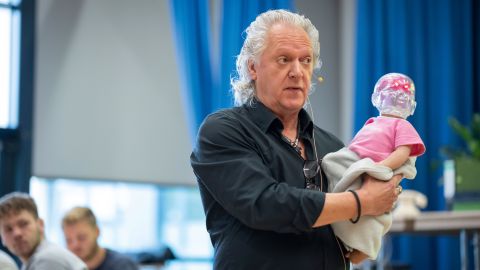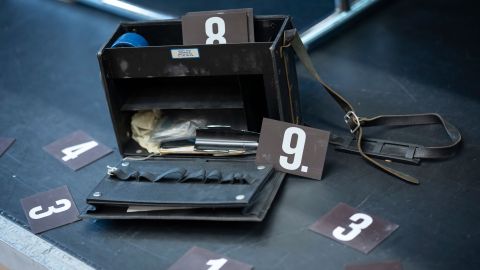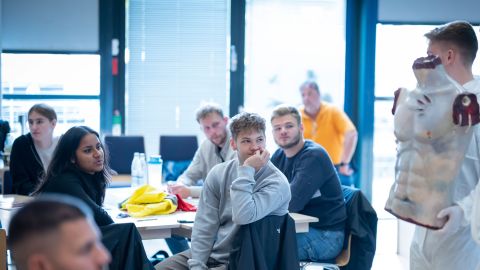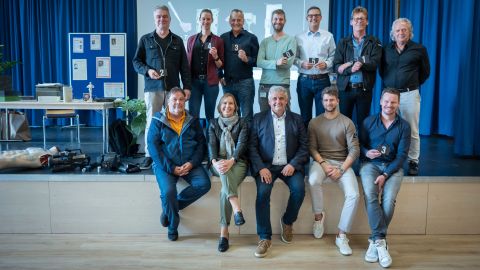Two children. A garbage bag. A mutilated corpse without a head. And where there were arms and legs, only bloody stumps.
Shock. Horror. Horror: "God, who would do that?" This is the stuff that addictive crime series are made of. Most of them start on a gray day with lots of fluttering tape. Opening sequence: A grumpy coroner bends over the dead man. Cut. The camera pans to a tired inspector who has just crawled out of bed. Cut. Who is the victim? Who is the perpetrator? Or is there perhaps more than one? The first episode begins with these questions. Then the investigation picks up speed from episode to episode. At the same time, the detectives and their team become increasingly entangled in the mysterious case, in which the boundaries between good and evil often become blurred in the end.
Stop. We don't want to spoil what happens next. Because the case with the mutilated corpse was also a crime thriller, but not one that was shown on Netflix. It really happened. In the Kalk district of Cologne. In 1997, teenagers found the muscular torso of a man who had obviously been stabbed to death. The story was so gruesome, so convoluted, that it gave almost 300 first-year trainee inspectors in the cathedral city another headache this July. The police trainees were given an insight into the work of their fellow inspectors at the "Theme Days K - All Crime Scene or What?".
Our job is often more exciting than a thriller.
First Chief Inspector Markus Weber, Head of the Cold Cases Investigation Group in the Death Investigation Department (KK 11)
Four stab wounds to the heart from above, one stab wound to the right lung from below. Combine. "How were the stabs carried out?" asks Bernhard Hatterscheidt, who was a homicide investigator for a long time and is now responsible for internal crimes against public officials. "In the movies, it's always the nasty guys who go after colleagues and take their badges and service weapons," he explains with a wink. But things are very different at the CID than in an action movie. That's why the detective chief inspector is on stage today at the Forum on Walter-Pauli-Ring, collecting initial evidence about the possible course of events in Cologne-Kalk. A participant hesitantly raises her hand: "Why didn't such a strong man put up a fight? Was he perhaps stabbed in his sleep or was he drugged?" An important first detail.
A hands-on CID, that's what this day is all about. It is an experiment to inspire young professionals to join the hunt for criminals: solving murders, catching robbers, observing drug dealers, stopping gangs, convicting white-collar criminals, fighting extremists. The tasks of plainclothes police officers are many and varied. They ensure that crimes and offenses are solved. To do this, they collect evidence and document everything carefully. So that the perpetrators can ultimately be convicted.
House searches, raids, interrogations, forensics, undercover investigations. When new police recruits were asked a few years ago: "Where do you see yourself in ten years?", the majority answered: "In the CID." However, when the question was posed at the theme day in Cologne, only four of the 80 police students taking part in the third of a total of four events responded. It is a reflection of the current situation. Because in times of a shortage of skilled workers, there is not only a lack of programmers, mathematicians and engineers in many places, but the number of applications for the CID is also falling.
Shortly after the coalition parties' agreement on the future was announced, the Task Force 3,000 was set up in August 2022 to recruit 3,000 police candidates per year in North Rhine-Westphalia. This resulted in a total of over 11,000 young people applying to work as police officers. And from these applications, over 3,000 suitable candidates could be recruited in 2023. Interior Minister Reul said: "We need highly qualified people. Future police officers must be fit both intellectually and physically." A reliable attitude and a clear commitment to our democracy are also important. In addition, not everyone sticks it out to the end, as is the case with other courses.
Those who make it through could later specialize in the criminal investigation department. But interest is low. The criminal investigation department has lost its appeal among police trainees.
"The problems are partly home-made," says Chief Criminal Director Michael Esser, for many years head of state security and the investigative commission to combat child abuse. As head of Cologne's criminal investigation department, he is concerned about the development: "Today, young people mainly join the police to do guard duty." On the one hand, this is due to the image of the officer in uniform conveyed by advertising. But the training also focuses on guard duty (GE and traffic). The police offer other challenging and interesting areas of work in addition to guard duty. "I would like to see more training content at the CID," he says.
CID investigators need a keen eye for detail and the ability to piece together seemingly insignificant details to form a larger whole.
Chief Criminal Director Michael Esser, Head of the Cologne Criminal Investigation Department
Back to the forum at Cologne Police Headquarters. Sitting at eight themed tables in the hall are 80 trainee inspectors who will be starting a dual course of study with the Cologne police in September 2022. The eight tables represent the eight criminal investigation departments that exist at Cologne CID. The trainees are currently doing a 14-day internship there. They have a long first year behind them: lectures at the University of Applied Sciences for Police and Public Administration (HSPV), training at the State Office for Training, Further Education and Personnel Affairs (LAFP) in Brühl, an exhausting block of exams. Her timetable now includes six weeks on guard duty at a district police authority and a short flying visit to the criminal investigation department.
"Ten days are over very quickly. The most you can do is get a brief taste of a small area," says Criminal Director Silke Paul, head of Criminal Investigation Department 5, which also has its own table. On it are a baseball bat, a bottle of schnapps, a broken bicycle lock and a brochure. On the cover is a photo of a desperate woman. One look and everyone immediately knows what Paul's 200 people are dealing with. The regional police stations of AI 5 are broad-based entry-level police stations: theft, fights, domestic violence - the range is wide. But for now, the theme day is all about murder.
The stage with the blue curtains is familiar from numerous live streams, when investigators announce successful investigations at press conferences, warn the public or ask for their help. Today, a body has been found where the cameras would normally be. Noel (21), Luis (20), Anton (20) and Louis (21) have pulled white overalls over their hoodies and are staring at a blue plastic bag. They have just found the torso of Köln-Kalk. Just a model, of course, but in original size. There is a blue bruise below the lungs and a birthmark on the left side of the chest. The stumps of the arms and legs are bloody. Who is the dead man? Chief Inspector Hatterscheidt instructs his investigators on how to work the crime scene. Luis takes photos, his Spusi colleagues inspect the scene - sorry, the place where the body was found.
Are there fingerprints or traces of blood? In a forensics case, the four investigators find a UV lamp, soot powder, DNA swabs, brushes and number plates. Everything has to be documented precisely, because even the smallest clue can be decisive in court. Luis takes more photos when his colleagues make a find: There are fingerprints in the bag and blood on the stage. The perpetrator has wiped it away, but under infrared light it becomes visible again. The four young men from the Spusi are proud: "Man, we're good investigators."
The Kalk case is now more than 26 years old. That's why no one knows exactly what time it was when the emergency call came in to the police station (KK 62). Today, Detective Superintendent Keshia Orford (30) works there. She was still attending kindergarten when the police officers, who are now her colleagues, desperately searched for the identity of the dead man from Cologne-Kalk: Neither DNA nor fingerprints were listed in a database. A dead end - at first.
In 1997, the internet was still in its infancy, smartphones were not yet a thing and digitalization was not an issue. But even back then, crime never stops. The K-Wache is the "CID after hours". Orford and her team go out when their colleagues from the other K stations are already at home. The senior inspector joined the police after graduating from high school and swapped her uniform for plain clothes and a criminal badge after six years on guard duty: "I wanted to work more independently, not just record crimes, but also solve them."
Your most interesting case? "A shooting in the rocker scene," says Orford. One person was killed. She interviewed witnesses, recovered bullet casings, traces of blood and videos. Why does she like the work? She says: "Robbery, murder, sexual offenses, unexplained deaths - KK 62 covers all kinds of topics." She doesn't lose pay because she still works shifts. But that's not a must. "A regular 8-hour day is also possible," she says. But then she would have to move to another police station.
"Maybe organized crime or robbery? Cold cases is also cool," muses Lisa-Marie Sales (21). She sits at table 4, where handcuffs, photos of hooligans and arrest warrants lie. They are the insignia of Criminal Investigation Department 4 - "intensive offenders". Perhaps their future? "Nope", the trainee inspector can't imagine that, but perhaps "Organized gang and drug crime" in Criminal Investigation Department 2 with seven highly qualified specialist departments. She laughs: "There's definitely a lot of adrenaline there." During her internship at KK 56, she is currently working on reports of domestic violence every day. "A lot of paperwork," she says. Then it's KK 11 instead. There's a doll on the table. It screams when it is switched on. When it is then shaken by annoyed parents, the damage that shaking causes to a child's brain becomes visible. Diodes light up in the doll's head - it falls silent. Leyla Schumacher (19) holds the "infant" in her arms. "Cruel," she says.
In fact, the two policewomen don't yet know exactly where their journey will take them. Over the past four weeks, they have been on guard duty and rotating shifts. "Something different every day, which was also exciting."
Cases such as the "Torso" case, which in the end was not a murder but a manslaughter - in the heat of passion. But nobody in the hall knows that at the moment. There is new information on stage. More garbage bags with body parts have turned up all over the city. One of them contains a leg in a pair of trousers and a bank statement in the trousers. Is this finally the clue we've been waiting for? The detectives are puzzled: Where is the head?
Career sites, job exchanges, social media - many companies still rely on established channels when looking for employees. With campaigns such as the theme day, the police now want to take a different approach and focus more on the needs of the younger generation: Information no longer via PowerPoint, but hands-on. One aim: to counter prejudices. Because in surveys, people say things like: "Only old people work for the police" or: "You can't work with them." Not true.
"We need young people because the criminals are constantly upgrading their technology and becoming ever more cunning," says Jupp. The First Chief Inspector of Criminal Investigation is actually called Hermann-Josef Schmitz. But his colleagues all just call him Jupp. Jupp is 63 years old and could be retired by now. But he doesn't like it quiet. That's why he has extended his contract. "The job is just too much fun." At the theme day, he wants to introduce the trainee inspectors to the fun. He has brought complete gangster equipment with him and explains how so-called "skimming" works - spying on electronic data from debit and credit cards. It is just one small area in the big world of crime at Criminal Investigation Department 3, where around 200 employees not only hunt down fraudsters, but also white-collar criminals and also support other criminal investigation departments in the area of computer crime and IT forensics. Corruption cases are also included.
Many gangsters now operate digitally, use encrypted channels and meet on the darknet. This is why the hunt for them is increasingly taking place virtually. More and more cases of everyday crime are being committed digitally every year.
When Jupp did his training more than 40 years ago, he still typed his reports on a typewriter. On Fridays, Chief Inspector Derrick investigated on television. Please who? Jupp's colleague Sophie Mohr (28) has never heard the name. But Jupp doesn't know "Luther". A Netflix detective, Schimanski type. Who? It's not just the names of the detectives that have changed, but also the methods of the criminals. But whether old or young, the ambition of the detectives is the same: they want to fight injustice and protect citizens.
KK 33, fraud squad: This is where Sophie Mohr hunts down gangsters who rip off their victims on PayPal or eBay classifieds. They are usually phantoms with false names who hide well on the World Wide Web. Or fraudsters who pretend to be Microsoft employees and then plant Trojans on other people's computers in order to spy out sensitive passwords or paralyze the software with viruses.
Does Mohr sometimes miss the blue light and patrol duty? She looks surprised: "Rarely." Over 1,000 cases come in every month, which are handled by a team of 30 people. She and her colleagues are currently on the trail of a fuel fraudster and then there's the love scammer who is after the money of older ladies, and, and, and.
When Jupp started in the job, love scammers were still called marriage fraudsters. The First Chief Detective Inspector is certain: "When all generations work together, we are a strong team. The old people bring the experience, the young people the know-how about the new media." Because whether online or analog: "Criminals are still as active as ever. They want to trick, exploit and rip people off. We have to prevent that."
Cold cases, state security, video recordings of pickpockets accosting passers-by - then the theme day comes to an end. But the "MK Torso" murder case has not yet been solved. Did the bank statement put the investigators on the right track? Combine. Correct. Days later, Bernhard Hatterscheidt and his colleagues from "MK Torso" rang the doorbell of the victim's relatives in Cologne. When they stood in the living room and saw the floor, they knew immediately: this was the crime scene. Why? The young colleagues are puzzled: Was there still blood? No, that would be too easy. Had the floor been scrubbed with too strong a cleaning agent? "No." Maybe there were stains in the carpet? "Hot." Hatterscheidt clarifies: "The carpet was no longer there because the body had been dismembered on it."
The victim was the brother-in-law. He had always visited his brother's wife and daughter when he was on the night shift and was often drunk. When it came to sexual assault, the mother grabbed a knife, stabbed him and cut him up. Investigators found the rest of the body in more garbage bags in the cellar. The brother-in-law's head was in the oven - completely charred. It doesn't get any more dramatic than this.
When can I apply to the CID?
After completing their three-year bachelor's degree, police officers first spend a year on patrol duty. This may be followed by three years in a task force. They can then switch back to patrol duty or specialize, for example as a criminal investigator, pilot in the air squadron, motorcycle police officer, service dog handler and much more. Irrespective of this, it is possible to join the CID immediately after graduation if the junior officers already have special prior knowledge or qualifications relevant to criminal investigation.
